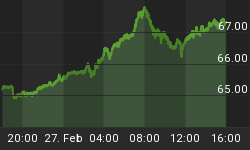The following is excerpted from a commentary originally posted at www.speculative-investor.com on 6th January 2013.
Why is gold in a bull market? The answer isn't "price inflation", because although "price inflation" is happening it isn't widely perceived to be a major problem at this time. Furthermore, there was relentless "price inflation" during the 1980s and 1990s while gold was in a bear market. Monetary inflation is part of the answer, but it isn't the most important part because there was plenty of monetary inflation during the 20-year period when gold was in a bear market. The reversing of the US stock market's secular trend (from up to down) during 2000 is also part of the answer, but saying that gold is in a bull market because the stock market is immersed in a secular valuation decline just prompts the question as to why this should be so. Why should a long-term gold bull market coincide with a long-term equity bear market?
The answer to the question "Why is gold in a bull market?" is related to the propensity to save. When there is an increase in uncertainty and/or the perceived level of economic/financial-market risk, people naturally want to save more and spend less. This is especially the case after an economy-wide inflation-fueled boom turns to bust, because in this situation debt levels will be high, many investments that were expected to generate large returns will be shown to have been ill-conceived, and it will be clear that much of what was generally believed about the economy was completely wrong. The public's first choice in such circumstances would be to hold more money, but central banks and governments respond to the factors that are prompting people to save more by taking actions that reduce the value of money. Policy-makers do this because they are operating from the Keynesian playbook, in which almost everything is backward. In the real world an increase in saving comes at the beginning of the economic growth path and an increase in consumption-spending comes at the end, but in the Keynesian world the economic growth path begins with an increase in consumption-spending. Moreover, in the back-to-front world imagined by Keynesian economists an increase in saving is considered bad because it results in less immediate consumption.
So, things happen that make the public want to save more, but the central planners then say "if you save more in terms of money we will punish you!" They don't actually say "we will punish you", but they take actions that guarantee a real loss on cash savings. However, the actions taken to reduce the appeal of saving in terms of the official money do nothing to reduce the underlying desire for more savings. In fact, the actions tend to further undermine the economy and create more uncertainty, thus leading to an even greater propensity to save.
That's where gold comes in. People want to save more, but they can't save in terms of the official money unless they are prepared to lock-in a negative real return on their savings. They therefore opt for the next best thing: gold. Gold is almost as liquid and as transportable as money, but its supply is essentially fixed. Gold also has a very long history as a store of value and as money, so even though it is presently not money it is a good alternative to cash.
Long-term gold bull markets can therefore be viewed as periods lasting 10-20 years when the public has an increasing propensity to save and when the actions of the authorities make it increasingly risky to save in terms of the official money.
The best ways that we know of to illustrate gold's major trend are via long-term charts of 1) the Inflation-Adjusted (IA) gold price, 2) the gold/commodity ratio (gold relative to the Continuous Commodity Index (CCI)) and 3) the gold/Dow (or gold/SPX) ratio. The first two are displayed below.


"Price inflation" was widely viewed as a big problem during the 1970s, but if the gold bull market of that decade had been primarily driven by "price inflation" then the gold price would not have made huge gains in inflation-adjusted terms and relative to the prices of almost all other inflation hedges (other commodities, for example). It made huge real gains because there was an increasing propensity to save, and because in addition to there being a general expectation that holding the official money would generate a real loss there was uncertainty regarding the on-going viability of the entire monetary system.
"Price inflation" has not been widely viewed as a big problem over the past 10 years, but it is clear to many people that the Fed has been playing fast and loose with the US dollar. There are also obvious questions about the long-term viability of the euro, the main fiat-currency alternative to the US$. At the same time, economic progress has slowed, investments in stocks and real estate seem a lot riskier than was the case several years ago, and nominal interest rates have been forced down to levels where real returns on monetary savings are certain to be well into negative territory even with annual "price inflation" of only a few percent.
Unless the world's major economies miraculously return to health despite policy-makers doing the opposite of what they should be doing, or policy-makers start doing the opposite of what they have been doing, the propensity to save will remain in a long-term upward trend and savers will be forced to consider liquid alternatives to cash. That is, gold's long-term bull market will remain intact.
We aren't offering a free trial subscription at this time, but free samples of our work (excerpts from our regular commentaries) can be viewed at: http://www.speculative-investor.com/new/freesamples.html















